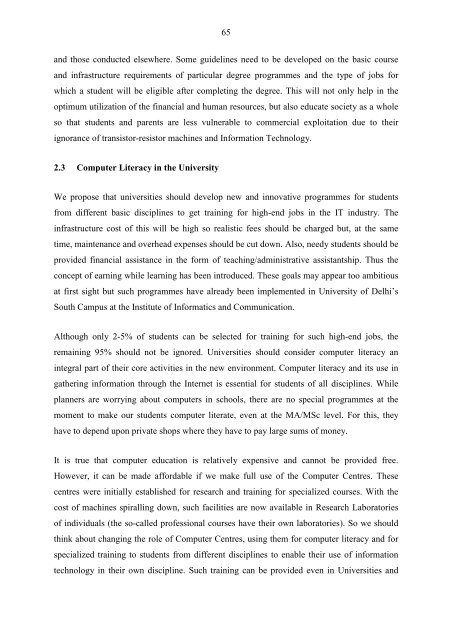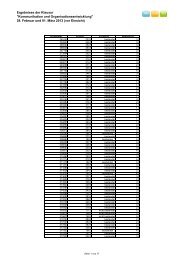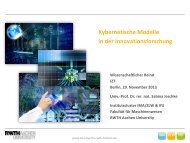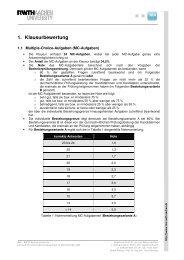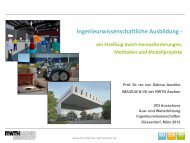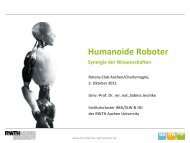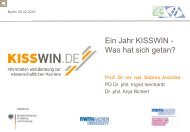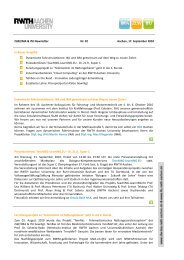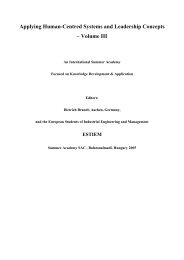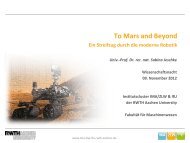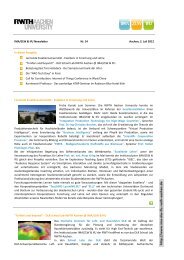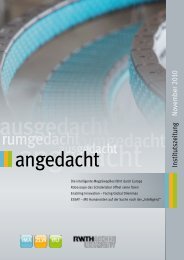Vol. II: Shaping Information and Communication ... - IMA,ZLW & IfU
Vol. II: Shaping Information and Communication ... - IMA,ZLW & IfU
Vol. II: Shaping Information and Communication ... - IMA,ZLW & IfU
Create successful ePaper yourself
Turn your PDF publications into a flip-book with our unique Google optimized e-Paper software.
65<br />
<strong>and</strong> those conducted elsewhere. Some guidelines need to be developed on the basic course<br />
<strong>and</strong> infrastructure requirements of particular degree programmes <strong>and</strong> the type of jobs for<br />
which a student will be eligible after completing the degree. This will not only help in the<br />
optimum utilization of the financial <strong>and</strong> human resources, but also educate society as a whole<br />
so that students <strong>and</strong> parents are less vulnerable to commercial exploitation due to their<br />
ignorance of transistor-resistor machines <strong>and</strong> <strong>Information</strong> Technology.<br />
2.3 Computer Literacy in the University<br />
We propose that universities should develop new <strong>and</strong> innovative programmes for students<br />
from different basic disciplines to get training for high-end jobs in the IT industry. The<br />
infrastructure cost of this will be high so realistic fees should be charged but, at the same<br />
time, maintenance <strong>and</strong> overhead expenses should be cut down. Also, needy students should be<br />
provided financial assistance in the form of teaching/administrative assistantship. Thus the<br />
concept of earning while learning has been introduced. These goals may appear too ambitious<br />
at first sight but such programmes have already been implemented in University of Delhi’s<br />
South Campus at the Institute of Informatics <strong>and</strong> <strong>Communication</strong>.<br />
Although only 2-5% of students can be selected for training for such high-end jobs, the<br />
remaining 95% should not be ignored. Universities should consider computer literacy an<br />
integral part of their core activities in the new environment. Computer literacy <strong>and</strong> its use in<br />
gathering information through the Internet is essential for students of all disciplines. While<br />
planners are worrying about computers in schools, there are no special programmes at the<br />
moment to make our students computer literate, even at the MA/MSc level. For this, they<br />
have to depend upon private shops where they have to pay large sums of money.<br />
It is true that computer education is relatively expensive <strong>and</strong> cannot be provided free.<br />
However, it can be made affordable if we make full use of the Computer Centres. These<br />
centres were initially established for research <strong>and</strong> training for specialized courses. With the<br />
cost of machines spiralling down, such facilities are now available in Research Laboratories<br />
of individuals (the so-called professional courses have their own laboratories). So we should<br />
think about changing the role of Computer Centres, using them for computer literacy <strong>and</strong> for<br />
specialized training to students from different disciplines to enable their use of information<br />
technology in their own discipline. Such training can be provided even in Universities <strong>and</strong>


